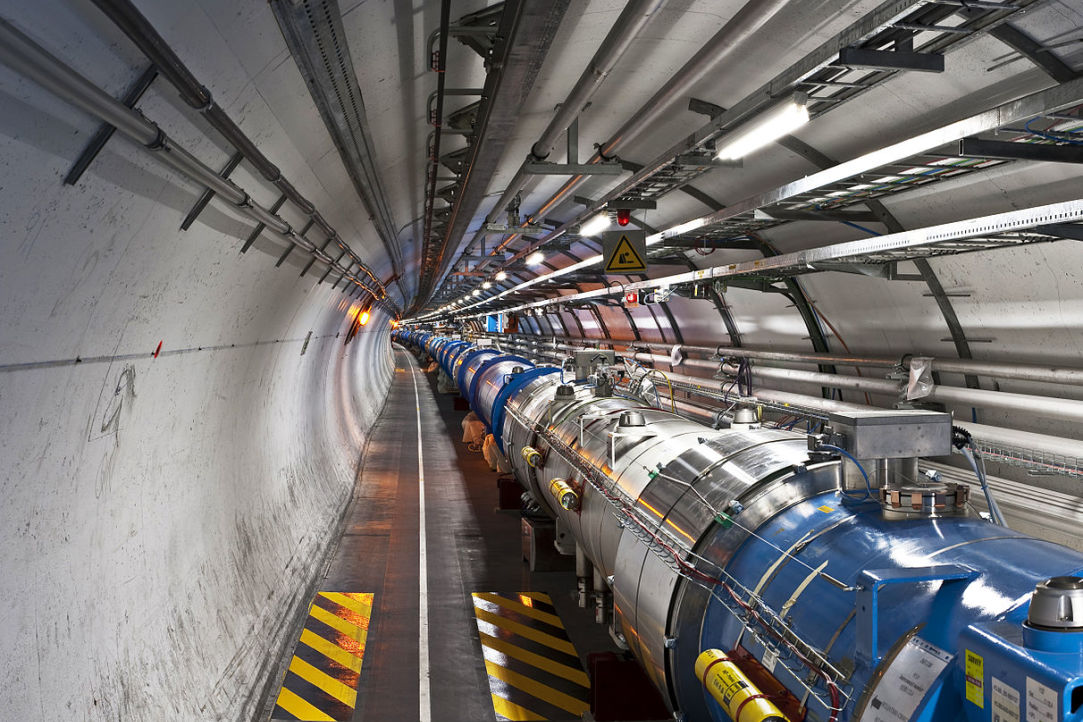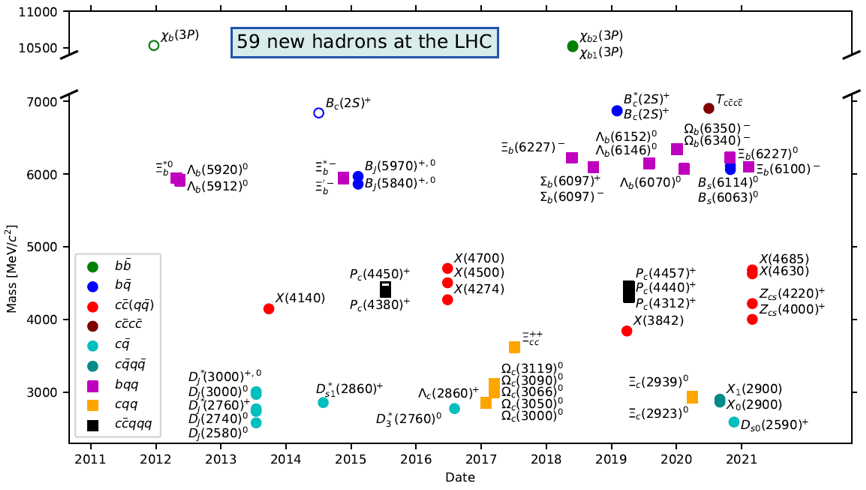Large Hadron Collider: New Hadron Discovery Factory

LHCb, a collaboration of one of Large Hadron Collider experiments, including a team of HSE University researchers, has published a news piece about the discovery of new tetraquarks, which are exotic hadrons consisting of four quarks. This discovery was made possible thanks to massive data samples gathered by the LHCb experiment with the use of algorithms developed at HSE University.
The Large Hadron Collider (LHC) is a 27-km long machine at the European Organization for Nuclear Research (CERN), in which protons are accelerated to 0.999999991 of the speed of light and collide in four big experiments. Hadrons (from the Greek word ἁδρός, which means ‘thick, massive’) are a class of particles that include protons – hence the word ‘hardon’ in the LHC name.
Before the 1960s, hadrons were believed to be the elementary particles that comprise matter. Only in 1964 did researchers propose a hypothesis that hadrons may consist of quarks and antiquarks. Combinations of quarks may be in quantum-mechanical state with minimal energy – their main state – but like electrons in atoms, quarks may also be observed in excited states with different angular momentum values and quark spin orientations. Following the tradition of elementary particle physics, all of these quantum states are called hadrons and, more generally, particles.
In the quark model, hadrons consist of two or more quarks bound by strong interaction. They also interact strongly with each other, like protons and neutrons interact in the atomic nucleus, for example. The particles consisting of quark-antiquark couple are called mesons; three quarks (or three antiquarks) – baryons; and four – tetraquarks, which are also called ‘exotic hadrons’. Rarer pentaquarks have also been discovered.

Huge numbers of hadrons appear in proton collisions in the LHC. But to effectively reconstruct and experimentally observe them, high-quality detectors are needed.
The figure from CERN news demonstrates new hadrons discovered on LHC since its launch in 2010. The colour of the symbol next to the hadron name indicates the contents of the particle quarks. Hadrons are grouped by their mass and year of discovery.
Over the 11 years since the LHC has been in operation, scholars on ATLAS, CMS and LHCb research collaborations have discovered 59 hadrons: on average, one every two months. ‘Clearly, the LHC is a Large Hadron Discovery Factory. Fifty-two of the 59 hadrons discovered in the LHC were discovered by LHCb collaboration researchers, which includes a team of scholars from HSE University,’ said Fedor Ratnikov, Leading Research Fellow at the HSE Faculty of Computer Science.
Four more exotic hadrons were added to this list today due to LHCb collaboration. Two of these new tetraquarks, Zcs (4000) + and Zcs (4220) +, consist of (c anti-cus). The other two new tetraquarks, X (4685) and X (4630), consist of c anti-c and s anti-s quarks.
HSE University joined the LHCb experiment in 2018. The group based at the HSE Faculty of Computer Science, together with researchers from the Yandex School of Data Analysis, has done significant work to optimize the selection of interesting events in real time and to improve the quality of identifying various types of particles in the detector. Much of the data necessary for discoveries on LHCb is processed by algorithms developed at the Faculty.
‘This and some other improvements have become possible thanks to the highest expertise in machine learning methods that has been accumulated by the Faculty of Computer Science and used to ensure the best physical results on the experiment,’ said Fedor Ratnikov.
Today, LHC is undergoing considerable modernization. The start of the next session of the collider operation is scheduled in a year. Research teams are preparing experiments to collect new data as they implement new cutting-edge processing methods and new discoveries.
See also:
Pivot to the East: A Comprehensive Study of the Cultural and Civilisational Centres of the Non-Western World is the Top Priority
China and the Chinese world, South Asia, Southeast Asia, the Arab countries, Iran, Turkey, Central Asia and Africa are gaining new significance in Russia’s foreign policy. However, we do not know enough about the Eastern countries. It is necessary to change the priorities in education, starting from grammar school. Prospects for the development of domestic Oriental studies in the context of the new stage in the development of the system of international relations were discussed at a round table at HSE University.
‘I Admire HSE Students’ Eagerness to Learn, to Discuss, to Broaden Their Perspectives’
Robert Romanowski was a ‘Digital Professor’ at HSE University in November 2021. In his interview for the HSE News Service, he talked about the specifics of online teaching, his course on Strategic Branding, and the skills that are essential for marketing professionals today.
Russia and Africa: Time to Expand Cooperation
There is major potential for economic and humanitarian cooperation between Russia and African countries. Particularly, Russian organisations and universities can help transfer competencies and knowledge in the fields of agriculture, energy, industrial production, environmental management, climate change, and public administration. Experts and representatives of African embassies in Russia discussed these issues at the round table ‘Russia-Africa Sharing Knowledge’ hosted by HSE University.
The Brain in Space: Investigating the Effects of Long Spaceflights on Space Travellers
As part of an international project conducted with the participation of Roscosmos and the European Space Agency, a team of researchers used differential tractography to analyse dMRI scans ofcosmonauts’ brains and found significant changes in brain connectivity, with some of the changes persisting after seven months back on Earth. The paper is published in Frontiers in Neural Circuits.
HSE University-Perm and the Training Centre of the Uzbek Ministry of Finance Sign Cooperation Agreement
HSE University in Perm has become the first academic partner of the Training Centre under the Ministry of Finance of the Republic of Uzbekistan. The parties have signed a cooperation agreement in education and research.
HSE University Strengthens Ties with Netherlands in Agricultural Research and Education
On November 9, 2021, HSE University signed a memorandum of understanding with Wageningen University & Research, a major university in the Netherlands and one of the leading agricultural research institutes in the world. Participants of the signing ceremony included HSE University Rector Nikita Anisimov, President of the Wageningen University & Research Executive Board Professor Louise Fresco, and Dutch Ambassador to Russia Gilles Beschoor Plug.
The Majority of Russians Do Not Support Microchip Implants
The majority of Russians would not agree to being fitted with microchip implants for any purposes—medical or otherwise. A joint study conducted by HSE University’s International Laboratory for Applied Network Research and Aventica found that respondents believe the risks of personal data leaks and misuse to be too high.
‘We Can Now Say That the Finance Conference Is Global’
The 10th International Moscow Finance Conference, organized by HSE ICEF, took place on October 29–30 online. Vladimir Sokolov, Head of the International Laboratory of Financial Economics, which hosted the conference, talks about the participants, the key presentation topics and how they will impact the global economy.
HSE University Scholars Study Green Transition Risks and Greenhouse Gas Emission Regulation
The UN Climate Change Conference is taking place from October 31 to November 12 in Glasgow. The conference focuses on preventive measures against the catastrophic and irreversible consequences of rising average global air temperatures. Igor Makarov, Head of the HSE Laboratory for Economics of Climate Change, will be taking part in the Glasgow conference. In the following interview, he speaks about the pressing problems Russia and the world are facing, and the research HSE scholars are doing on climate change.
Applications to Speak at eSTARS 2021 Conference Accepted Until November 15
HSE University and Coursera are bringing together the world’s leading researchers, professionals, education and technology leaders, and business community representatives for the fourth international research conference eLearning Stakeholders and Researchers Summit 2021 (eSTARS). This topic of this year’s summit, which will run from December 1–2, 2021,is ‘Digital Transformation: Global Challenges to the Education System’.


